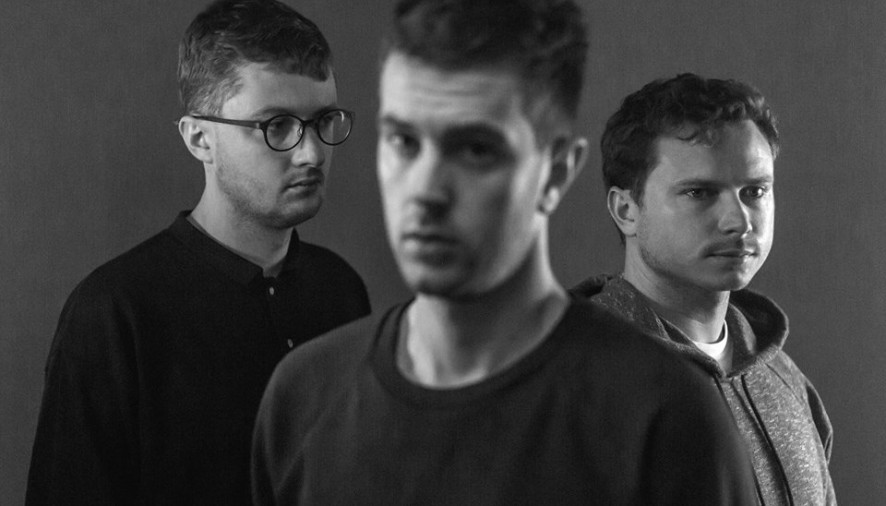We catch up with Mercury Prize nominated band, Portico, ahead of their Leeds show this weekend.
Portico’s recent name change from Portico Quartet does not just signify the departure of Keir Vine from the band, but represents a rebirth in musical interests. Mercury prize nominated band, Portico Quartet started in 2005 with Keir Vine replacing Nick Mulvey in 2011 after he left to pursue a solo career. The remaining three, Jack Wyllie, Duncan Bellamy, and Milo Fitzpatrick have just released Living Fields, Portico’s first album under the new name, which delves into the world of electronica, moving worlds away from the modern jazz music they were previously producing. They are about to embark on a UK tour and ahead of their upcoming gig on the 21st November at Headrow House, I spoke to Jack Wyllie about the past, present and future of the band.
Living Fields was released in April 2015 and is an album of electronic music with a heart and an ethereal atmosphere throughout. Featuring three vocalists, it is amazing how cohesive each track feels with the preceding one, something which creates a perfectly interwoven album. When asked whether there was an overriding theme, Jack explained how it was based “around this documentary, Nostalgia for the Light, which is about the Atacama Desert in South America.” He says when they “worked with the singers it was kind of a way to tie everything together so that the lyrics all have a conceptual front.” He also told me how the film reflected some of the things happening in the band’s personal lives, “so we found it quite meaningful and felt like it was a good reference point to send out to the singers to help get the lyrics working.”
The album features vocals from lead alt-J singer Joe Newman, Jamie Woon, and Jono McCleery – who performs with them at live shows. Jack explains that they “were always going to work with those three guys’ and even though they did try a few other singers out, they felt like those three would fit together. I asked if they had a specific vocalist in mind from when they first started writing the album and Jack replied that “we would generally make the instrumentals first and then decide who it would suit, but I do think they could each work on the other tracks even if it did sound a bit different.” Perhaps the fact that the singers would fit each song has something to do with the band’s close connections with them; Jack lived with Jamie Woon for a few years and grew up living on the same road as Joe Newman in Southampton. Jono supported the band back in 2010 and is now a label mate on Ninja Tune, performing with the band on their live shows, which led Jack to say how nice it has been getting to know him well and that there is “a really nice dynamic.”
Even if under the name ‘Portico’ they may seem to be a new band, Living Fields has an accomplished sound that could only be achieved through years of experimentation and hard work. Jack states that they “set out with an agenda to make something quite different, to move away from the jazz world to reflect a little bit more on the music that we’re listening to.” It took them a while to write due to changes in their lives over that period, but by taking their time, they were able to wipe the slate clean and write what they really wanted to. He says that even when writing it, he knew that, “understandably”, there would be some backlash to their different type of music but that “the ideals would bring in new people and our fan base would evolve into something a bit different.” He suggests that perhaps some jazz music fans are almost “protective about it or that’s their thing and if you’re not doing it, you’re not doing it”. However, overall the reaction has been quite positive.
The last thing they released as Portico Quartet was the live/remix album, which Jack calls a “bit of a funny album” and “basically a kind of document” as they felt they should release something. With the remixes it feels like this album is heading in the direction of the Portico material but he maintains that it’s connected “more to the old stuff” as the Portico Quartet music makes up the spine of the album, even if there is an electronic side.
It’s not just their music that has changed dramatically but their methods of production too. In 2005 they started off busking on the South Bank, developing their songs in relation to the audience and then went and recorded it. Their second album had a similar process but their third was a 70:30 ratio and then as Portico Living Fields was almost completely produced.
Talking about what is next for the band Jack says they have begun to record a few songs for a new album, where they have shifted back to include some more live instrumentals, placing huge emphasis on the need to find the right balance between the old and the new. As both of the incredible sounds are distinctly individual, hearing a mix of the two is a very exciting prospect.
Polly Hatcher

